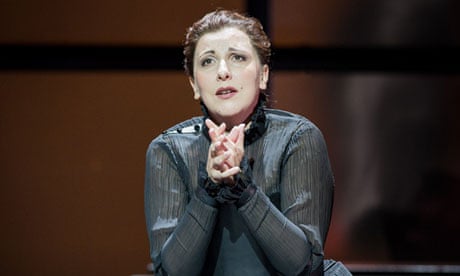With Anna Bolena, Welsh National Opera launched its Donizetti trilogy, The Tudors – labelled his "Three Queens" but rarely done together. It's a bold venture, playing to the public appetite for history, but the emphasis is stark not Starkey.
Sleekly black, sinister, modern in feel with occasional Tudor detail, and carefully textured, Alessandro Talevi's production steers well clear of anything reverential. No ruffs; skirts are full, but fall just below the knee. At Windsor Castle, Henry VIII's manages to look more like Bill Bailey, with neither paunch, jowls, nor codpiece, just chainmail by way of crotch-decor.
Yet if this seems a million miles from the period, so, too, is Donizetti's music, often relentlessly pretty 19th-century bel canto. Thus the concept, unremitting in its darkness, mirrors the skullduggery of the plot against Anne Boleyn, number two of Henry's six wives; the actual history is more operatic than opera itself in fact.
Designer Madeleine Boyd uses the Millennium Centre stage with flair: almost bare and chillingly lit, with a revolve creating some sweeping movement, and the chorus making choreographed ripples. Unsurprisingly, Boyd's most vivid images are the bloody ones: the birth of the future queen Elizabeth (time-telescoped here), Anna's stained birthing-gown displayed on a headless dummy, the billowing red over-robe she dons to walk to her execution.
In the title role, Serena Farnocchia rose nobly to her mad scene, and was more than matched by Katharine Goeldner's strongly portrayed Jane Seymour. The awkward trouser-role of the page Smeaton, whose obsession with Anna contributes to her downfall, was richly sung by Faith Sherman. Alastair Miles's Henry sometimes lacked vocal girth as well as physical, while Robert McPherson's Percy needed more charisma. Conductor Daniele Rustioni injected pace into the score whenever he dared.

Comments (…)
Sign in or create your Guardian account to join the discussion